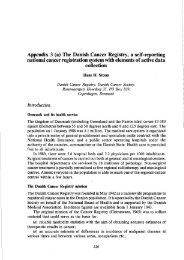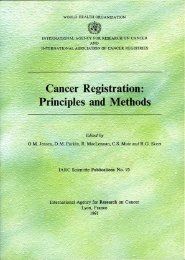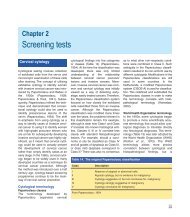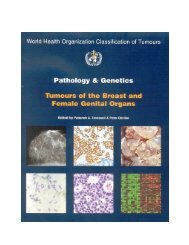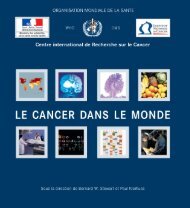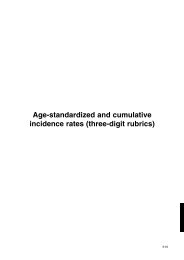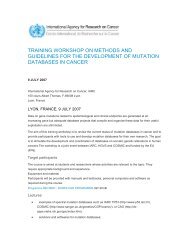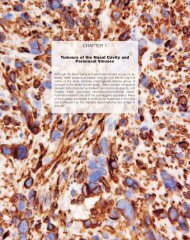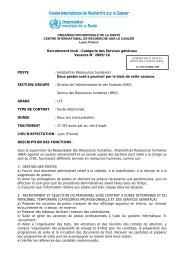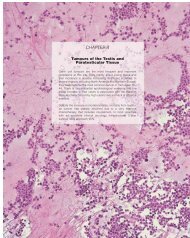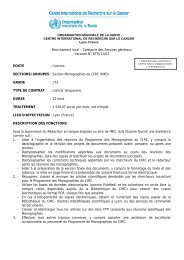world cancer report - iarc
world cancer report - iarc
world cancer report - iarc
You also want an ePaper? Increase the reach of your titles
YUMPU automatically turns print PDFs into web optimized ePapers that Google loves.
CANCER CONTROL IN GUINEA,<br />
WEST AFRICA<br />
Guinea is situated on the Atlantic coast of<br />
West Africa and has an area of 246,000<br />
km 2 . The estimated population was<br />
around 7.5 million in 1999, with an annual<br />
growth rate of 3%. The crude death<br />
rate is around 14 per 1,000 and the infant<br />
mortality rate around 134 per 1,000.<br />
Guinea has a fairly well developed primary<br />
health care system, but all health<br />
services levy charges.<br />
A population-based <strong>cancer</strong> registry was<br />
organized in 1990 to register incident<br />
<strong>cancer</strong> cases among the residents of<br />
Conakry, the capital. The registry <strong>report</strong>ed<br />
an overall average annual rate of 83.3<br />
per 100,000 males and 110.5 per 100,000<br />
females, during 1992-1994. The common<br />
<strong>cancer</strong>s in males were liver (age-standardized<br />
rate per 100,000 population<br />
32.6), prostate (8.1 per 100,000 population)<br />
and stomach (6.2 per 100,000 population);<br />
the predominant <strong>cancer</strong>s in<br />
females were cervix (46.0 per 100,000<br />
population), liver (12.5 per 100,000 population)<br />
and breast (10.9 per 100,000 population).<br />
Only a quarter of the registered<br />
<strong>cancer</strong>s were microscopically verified.<br />
The department of pathology at the<br />
University Hospital of Donka, Conakry, is<br />
the only histopathology service in the<br />
entire country. This is staffed by a<br />
Guinean pathologist trained in France<br />
and a locally trained laboratory technician.<br />
This laboratory processes around<br />
800 pathology specimens annually. Basic<br />
materials such as alcohol, formalin,<br />
with <strong>cancer</strong> in sub-Saharan Africa do not<br />
receive or complete the prescribed treatment.<br />
In regions of Asia and Latin<br />
America, the proportion of newly diagnosed<br />
<strong>cancer</strong> patients not receiving, or not<br />
completing, prescribed treatment ranges<br />
from 20% to 40%. Comparative studies of<br />
<strong>cancer</strong> survival in 11 developing country populations<br />
indicate that the average five-year<br />
survival associated with <strong>cancer</strong>s such as<br />
318 Cancer control<br />
stains and paraffin are always in short supply.<br />
The laboratory is equipped with an old<br />
but functioning microtome, a binocular<br />
microscope, a histiokinette and other<br />
materials, which are mostly donated from<br />
abroad.<br />
The University Hospital of Donka and the<br />
Central Hospital of Ignace Deen in<br />
Conakry, the capital of Guinea, provide<br />
most of the <strong>cancer</strong> diagnostic and treatment<br />
services in Guinea, though some limited<br />
surgery is possible in a few provincial<br />
hospitals. Conventional radiology, ultrasonography<br />
and endoscopy services are<br />
available in these hospitals. Clinically inoperable<br />
cases are not usually subjected to<br />
biopsy. Cancer treatment is mostly limited<br />
to surgery for early cervix, breast, ovarian<br />
and stomach <strong>cancer</strong>s and other operable<br />
superficial <strong>cancer</strong>s. There are no thoracic<br />
or neurosurgical facilities. A medical oncology/haematology<br />
oncology service has<br />
been recently organized in the University<br />
Hospital of Donka, staffed by a physician. A<br />
restricted spectrum of <strong>cancer</strong> chemotherapeutic<br />
drugs is available from this service<br />
on payment. There is no radiotherapy service<br />
available in Guinea. If patients can<br />
afford it, they are referred to Senegal or<br />
France for such treatment. In practical<br />
terms, very little can be offered for inoperable<br />
tumours. Charges are levied for all<br />
services in the public health care services<br />
in Guinea. There is some coordination and<br />
collaboration between the histopathology,<br />
surgery, gynaecology and medical oncology<br />
services in these two hospitals.<br />
A state-of-the-art private hospital with<br />
advanced medical, surgical and imaging<br />
colon and rectum, larynx, breast, cervix,<br />
ovary, urinary bladder, kidney, testis, lymphoma<br />
and leukaemia are 10-25 years<br />
behind those in the USA, Western Europe<br />
and Japan [5,6].<br />
Consensus policies on approaches to<br />
diagnosis, treatment and palliative care of<br />
<strong>cancer</strong> on a site by site basis for major<br />
<strong>cancer</strong>s, taking into account the<br />
resources available, are important in<br />
Fig. 7.12 The University Hospital of Donka, Conakry.<br />
Fig. 7.13 Women awaiting screening for cervical<br />
<strong>cancer</strong> at the University Hospital of Donka,<br />
Conakry.<br />
facilities mostly serves expatriates and<br />
affluent Guineans who can afford the<br />
services.<br />
There is no officially proclaimed national<br />
<strong>cancer</strong> control programme in Guinea.<br />
HBV vaccination is not part of the immunization<br />
protocol in Guinea. A limited<br />
experimental intervention to reduce<br />
exposure to aflatoxins has been organized<br />
in a small region near Kindia. There<br />
are no early detection programmes for<br />
cervical <strong>cancer</strong>. A formal evaluation of<br />
visual inspection with acetic acid for<br />
early detection of cervical dysplasia and<br />
their treatment with cryotherapy is ongoing<br />
in collaboration with IARC.<br />
developing <strong>cancer</strong> control programmes<br />
and may prove extremely useful in optimizing<br />
use of resources. Such policies are<br />
generally lacking in most developing countries.<br />
Palliative care<br />
A large proportion of <strong>cancer</strong>s in developing<br />
countries are diagnosed at advanced stage<br />
and thus palliative care merits a major place



